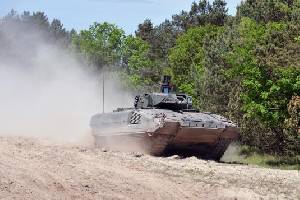Articles >>
PUMA infantry fighting vehicle is entering service with Bundeswehr
Category: Defence Industry

Following painstaking development work, intensive testing by the country’s WTD technical centers, month after month of gruelling operation in conditions of extreme heat and cold abroad, and multiple field trials conducted by soldiers of the German Bundeswehr, the Puma infantry fighting vehicle project has passed another important milestone. The Koblenz-based Federal Office of Bundeswehr Equipment, Information Technology and In-Service Support, or BAAINBw, has now issued the required “Approval for service use” permit. Nothing now stands in the way of the Bundeswehr fielding the new IFV. An added plus: issued with a regular number plate, the Puma is now allowed to operate on public roads. The Puma will gradually supersede the Bundeswehr’s Marder IFV, whose original version first entered service with German mechanized infantry units over forty years ago. Numerous prerequisites had to be met before the “Approval for service use” permit could be granted. Based on the results of tests and trials, various technical improvements were developed, qualified and successively integrated into the steadily optimized production vehicles. A formal evaluation by the Bundeswehr’s Office of Military Vehicles was required in order to obtain the necessary operating permit and roadworthiness certification. Effective 13 April 2015, the German Army Chief of Staff announced formal willingness to accept the Puma IFV. This enabled BAAINBw to issue the “Approval for service use” permit – an important step for the Puma, currently the German Army’s largest procurement project. This means that training of the trainers can begin as planned with an initial seven IFVs. Additional vehicles will follow in coming months. Trainer training will be conducted at the Munster Training Centre through to the end of this year. Set up especially for the Puma, a fielding organization has been established which will conduct initial Puma IFV training of mechanized infantry companies for a period of three months each at the Munster Training Centre of the armor corps. The fielding organization takes receipt of the vehicles from the manufacturer, outfitting them with special Bundeswehr equipment items before handing them over to the troops to be trained there. Thus, at the end of the three-month training period, the mechanized infantrymen can take their Pumas back to their home bases with them, enabling more troops to familiarize themselves with the new weapons system. The necessary contracts for maintenance and technical and logistical support between the Bundeswehr and the contractor, Projektgesellschaft PSM GmbH, have been concluded. PSM is a joint venture of system suppliers Rheinmetall and Krauss-Maffei Wegmann, each of which holds a 50% stake in the company. Long-term support for the Puma by the ground forces technology sector in Germany is this assured. |
Rheinmetall |
Rheinmetall to Feature Next Generation 130mm Tank Gun at AUSA Global
04.11.2019
Rheinmetall MAN Military Vehicles GmbH - RMMV
Rheinmetall Verseidag Ballistic Protection GmbH
Rheinmetall Soldier Electronics GmbH
Rheinmetall AG, Representative Office Abu Dhabi
Rheinmetall Waffe Munition GmbH
Rheinmetall Defence Electronics GmbH
Rheinmetall Waffe Munition Arges GmbH
American Rheinmetall Munitions, Inc. - ARM
Rheinmetall Denel Munition (Pty) Ltd - RDM
Puma 4x4 (Reconnaissance Vehicle)
Puma 6x6 (Wheeled armoured personnel carrier)
BWP-1M Puma (Infantry fighting vehicle)
Puma (Infantry fighting vehicle)
Puma M26 (Mine protected carrier)
Puma M36 (Mine protected carrier)
Discuss
